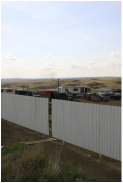 This past weekend in church, one of the readings was Romans 8.12-25. In it, I saw something new that I had never seen before even though it is a passage I have read and heard countless times during my life. It may even be one of those that I might even be able to recite part of from memory. It is curious to me how these things happen. Now Christians explain this as the Holy Spirit illuminating the scriptures. Which I do believe happens, however anyone who spends enough time with a text has the possibility to read it with “new eyes”. All those things that we encounter in our lives between the readings come into play and activate in our most recent reading to suggest the possibility of new depths of or alternate meanings. Whatever it is, I appreciate the new ideas and possibilities. So here is the passage: 12So then, brothers and sisters, we are debtors, not to the flesh, to live according to the flesh— 13for if you live according to the flesh, you will die; but if by the Spirit you put to death the deeds of the body, you will live. 14For all who are led by the Spirit of God are children of God. 15For you did not receive a spirit of slavery to fall back into fear, but you have received a spirit of adoption. When we cry, “Abba! Father!” 16it is that very Spirit bearing witness with our spirit that we are children of God, 17and if children, then heirs, heirs of God and joint heirs with Christ—if, in fact, we suffer with him so that we may also be glorified with him. 18I consider that the sufferings of this present time are not worth comparing with the glory about to be revealed to us. 19For the creation waits with eager longing for the revealing of the children of God; 20for the creation was subjected to futility, not of its own will but by the will of the one who subjected it, in hope 21that the creation itself will be set free from its bondage to decay and will obtain the freedom of the glory of the children of God. 22We know that the whole creation has been groaning in labor pains until now; 23and not only the creation, but we ourselves, who have the first fruits of the Spirit, groan inwardly while we wait for adoption, the redemption of our bodies. 24For in hope we were saved. Now hope that is seen is not hope. For who hopes for what is seen? 25But if we hope for what we do not see, we wait for it with patience. I think, looking back on it now, I likely read this passage in a way was about human struggles and the hope that comes from faith in spite of current circumstances. Now, without looking, Paul is writing to encourage and teach those living in Rome dealing with a pretty crappy situation struggling under persecution. This is all pretty standard. What was new for me is how creation is bound up with humanity in this struggle. Look at verse 19-23 again. Creation awaits salvation too! It languishes awaiting its freedom. Again, looking back on it, that I think I conflated humanity as part of creation, which it is, but verse 23 articulates an important rhetorical distinction (23and not only the creation, but we ourselves). This distinction that Paul sets between humanity and creation is an important one. We see, that creation suffers awaiting the same freedom from bondage that humanity awaits. This was an unbelievable thought. Over the recent years, with my interest in place and shifting theological emphases, I’ve come to think more about the relationship between humanity and the earth very differently. Often, for a variety of long held philosophical reasons firmly rooted in Protestant thought, the physical is diminished in favor of the spiritual. The logic goes that since “we” will fly away from this physical earth, it is of no real lasting significance. Tragically, the position of caretaker from Genesis becomes one of dominance and misuse rendering it a disposable reality to be mined for all its worth to fuel our economies. As I think about this further, this action only amplifies the groaning. Perhaps what has allowed this idea to emerge is my recent time in the oil fields of North Dakota. At the beginning of this month, I spent 2 solid days, driving through some of the most beautiful landscape of North Dakota which has now become a sprawling oil field. Land is being drastically reshaped, gouged, drilled, drug, and about any other manner of soil movement you might consider. I cannot help but to see the groaning of the earth around me when I drive out there. While the Psalms retell the laments of those who cried out, “How long?” I fear this is the cry of the earth as well?
0 Comments
Your comment will be posted after it is approved.
Leave a Reply. |
Ryan StanderArchives
January 2018
Categories
All
|

 RSS Feed
RSS Feed
